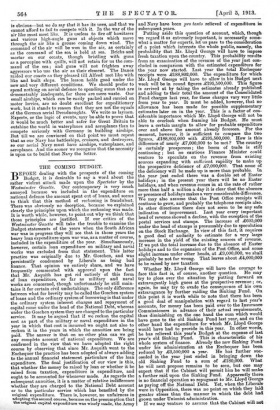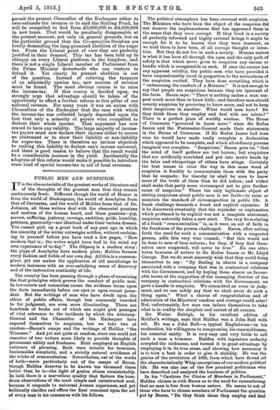THE COMING BUDGET. B EFORE dealing with the prospects of the
coming Budget, it is desirable to say a word about the rather violent attack made upon the Spectator by the Westminster Gazette. Our contemporary is very much annoyed because we included in the expenditure on national defence the amount spent out of loaus, and seems to think that this method of reckoning is fraudulent. There was obviously no deception, because we explained clearly the principles upon which the reckoning was made. It is worth while, however, to point out why we think that those principles are justified. If our critics of the Westminster Gazette will take the trouble to examine the Budget statements of the years when the South African war was in progress they will see that in those years the heavy loan expenditure upon war was, as a matter of course, included in the expenditure of the year. Simultaneously, however, certain loan expenditure on military and naval works was excluded from that statement. This latter practice was originally due to Mr. Goschen, and was persistently condemned by Liberals as being bad finance. That opinion we entirely share, and we have frequently commented -with approve/ upon the fact that Mr. Asquith has got rid entirety of this form of loan expenditure, so far as military and naval works are concerned, though unfortunately he still main- tains it for certain civil undertakings. The only difference between what for brevity may be called the Goschen system of loans and the ordinary system of borrowing is that under the ordinary system interest charges and repayment of capital come under the head of the National Debt, whereas under the Goschen system they are charged to the particular service. It may be argued that if we reckon the capital cost as part of the military or naval expenditure in the year in which that cost is incurred we ought not also to reckon it in the years in which the annuities are being paid. The answer is that on no other plan can we get any complete account of national expenditure. We are confirmed in the view that we have adopted the right course by observing that since Mr. Asquith went to the Exchequer the practice has been adopted of always adding to the annual financial statement particulars of the loan expenditure. The final justification of our view is this, that whether the money be raised by loan or whether it be raised from taxation, expenditure is expenditure, and ought to be accounted for whenever made. As regards the subsequent annuities, it is a matter of relative indifference whether they are charged to the National Debt account or to the particular service which has benefited by the original expenditure. There is, however, no unfairness in adopting the second course, because on the presumption that the original capital expenditure was wisely made, the Army and Navy have been pro tanto relieved of expenditure in subsequent years.
Putting aside this question of account, which, though i we regard t as extremely important, is necessarily some- what a matter for experts, let us pass to the consideration of a point which interests the whole public, namely, the probability that Mr. Lloyd George will have to impose fresh taxation upon the country. This probability results from an examination of the revenue of the year just con- cluded in comparison with the estimated expenditure for the year now started. Last year the total Exchequer receipts were £188,802,000. The expenditure for which Mr. Lloyd George will have to allow in his Budget next week will be in round figures £195,500,000. This figure is arrived at by taking the estimates already published and adding to their total the amount of the Consolidated Fund charges last year, for these charges vary very little from year to year. It must be added, however, that no allowance has been made for possible supplementary estimates later on in the year. This is a, factor of con- siderable importance which Mr. Lloyd George will not be able to overlook when framing his Budget. He must leave a. certain margin to allow for probable expenditure over and above the amount already foreseen. For the moment, however, it is sufficient to compare the two figures, £188,802,000 with £195,500,000. How is this difference of nearly £7,000,000 to be met ? The country is certainly prosperous ; the boom of trade is still continuing ; but no cautious Finance Minister could venture to speculate on the revenue from existing sources expanding with sufficient rapidity to make up the prospective deficiency of £7,000,000. That some of the deficiency will be made up is more than probable. in the year just ended there was a double set of Easter holidays ; in the present year there will be no Easter holidays, and when revenue comes in at the rate of rather more than half a million a day it is clear that the absence or presence of holidays makes a very considerable difference. We may also assume that the Post Office receipts will continue to grow, and probably the telephone receipts also. In other directions there does not seem to be any safe indication of improvement. Last year every important head of revenue showed a decline, with the exception of the postal services and stamps. The increase of £605,000 under the head of stamps is presumably due to speculation on the Stock Exchange. In view of this fact, it requires a good deal of audacity to estimate for a very large increase in the yield of the existing sources of revenue. If we put the total increase due to the absence of Easter holidays and to the expansion of the Post Office, and some slight increase under other heads, at £3,000,000, we shall probably be not far wrong. That leaves about £4,000,000 to be raised by new taxation.
Whether Mr. Lloyd George will have the courage to face this fact is, of course, another question. He may try to gloss over the situation by putting forward an extravagantly high guess at the prospective revenue ; or, again, he may try to evade the consequence of his own extravagance by further raiding the Sinking Fund. Oil this point it is worth while to note that there has been a good deal of manipulation with regard to last year's accounts, for money has been paid over to the Insurance Commissioners in advance of their actual requirements, thus diminishing on the one hand the sum which would have gone to the old Sinking Fund last year, and on the other hand the expenditure for which Mr. Lloyd George would have had to provide in this year. In other words, he has relieved this year's Budget at the expense of last year's old Sinking Fund. This is characteristic of his whole system of finance. Already the new Sinking Fund under his administration at the Exchequer has been reduced by £3,500,000 a year. He has further suc- ceeded in the year just ended in bringing down the old Sinking Fund to a sum of £180,000. What he will next propose remains to be seen, but one may expect that if the Cabinet will permit him he will make a, further raid upon the Sinking Fund. Apparently there is no financial operation so repugnant to Mr. Lloyd George as paying off the National Debt. Yet, when the Liberals were in Opposition, there was no point on which they laid greater stress than the manner in which the debt had grown under Unionist administration. If we may venture to assume that the Cabinet will not permit the present Chancellor of the Exchequer either to over-estimate the revenue or to raid the Sinking Fund, he will be compelled to find from £3,000,000 to £4,000,000 in new taxes. That would be peculiarly disagreeable at the present moment, not only on general grounds, but on the particular ground that the Co-operative Societies are loudly demanding the leng-promised abolition of the sugar tax. From the Liberal point of view they are perfectly justified in their demand. This tax has been held up to obloquy on every Liberal platform in the kingdom, and there is not a single Liberal member of Parliament from the Prime Minister downwards who can venture to defend it. Yet clearly its present abolition is out of the question. Instead of relieving the taxpayer of an admittedly unwise tax, new sources of revenue must be found. The most obvious course is to raise the income-tax. If this course is decided upon, we strongly urge that advantage should be taken of the opportunity to effect a further reform in this pillar of our national revenue. For many years it was an axiom with Chancellors of the Exchequer that the ease with which the income-tax was collected largely depended upon the fact that only a minority of payers were compelled to declare their whole income. That argument has now ceased to have any validity. The large majority of income- tax payers must now declare their income either to secure an abatement or to show their liability or non-liability for super-tax. There is therefore no serious objection to making this liability to declare one's income universal, and there is good reason to believe that the result would be a considerable increase in the yield. Incidentally the adoption of this reform would make it possible to introduce some kind of special income-tax in aid of local revenues.















































 Previous page
Previous page